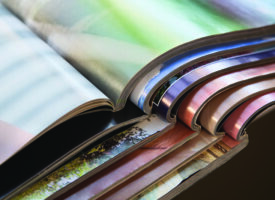No book, article or blog post can turn an aspiring writer into a successful journalist or freelance news writer. All that it can do, or aims to do, is to help the aspiring writer learn to write. The primary skill in learning to write is practice—to write and write, and then to write some more. To practice writing one must have something to write about. Some aspiring writers harness their skills by blogging or writing how-to articles; others write themes on their thoughts and reflections, and still others write from imagination. Among the most convenient subjects to write about for practice (or money) are the events and news in the world around us. Such topics are what skilled journalists and full-time freelance writers write about, and that is why we call this form of writing “journalistic writing” or “news writing.”
Characteristics
What is the difference between journalistic writing and other forms of writing? Journalistic writing is not a special literary gymnastic that requires a special talent and a expansive vocabulary. Some writers speak of it as a special genre of writing, like screenwriting, short story writing, or copywriting. In reality, news writing is the plainest, most reserved form of English composition; it is using the English language to tell what is going on in the world. As such, it has no special style, except in special circumstances. It requires no special talent beyond seeing and understanding what is taking place around us, to grasp its significance and relation to other events, and to tell others what we have seen and heard.
The writer can craft a news piece, blog post, or article in a fine, formal style or in a simple, conversational style; one writer may excel than another writer in perception,
style, or fluency. But, after all, the writer’s true purpose is to see, to hear, and to tell.
Journalistic writing differs from some other forms of writing in several ways, but the differences are not such as to make magazine writing different from non-fiction writing, or article writing different from blogging. Journalistic writing differs mainly in its subject matter and purpose. It is primarily functional. A writer finds himself writing a newsworthy story at a spur of the moment for a definite purpose. He pulls together quickly and easily a narrative, a description, or an exposition that encapsulates a current event. This current event may be breaking news, live coverage of a trade show, celebrity gossip, a presidential speech, a new product release, stock market news, or even a traffic accident..
Subject Matter
One of the chief characteristics of journalistic writing is timeliness and relevance. It has little time to talk about the past, except in comparison with the present. It has little time to foretell the future, except in pointing out the significance of the present. Its subject is today. It is primarily concerned with facts. The writer seldom writes about his opinion or what he thinks, and seldom brings himself into his writings. He considers himself a recorder of the things other persons are doing and thinking. This being so, he has little time to philosophize, to express opinions, or to dream. He seeks facts; and the facts he tells.
A study of current news sites, newspapers and periodicals devoted to news-style articles (not fiction)—the only models for journalistic writers—will show that their subject matter includes mostly the following: 1) unexpected events, like fires, accidents, or crimes; 2) expected events, like meetings, plans, movements, or legislation; 3) expressions of opinion by prominent men or women, as given in speeches or interviews. As you can see, all are today’s happenings. The writer may choose to narrate, describe, explain, or even argue; but each is a part of his effort to tell of timely events.
Sources of Material
You can find news-worthy material in the world about us—the things that people near us are doing or saying and the things that are happening to them. The Internet, library, history, and books of reference are sources of excellent information to help you understand these events and to tell them clearly. Online news sites like CNN.com, online news aggregators like Google News, and social media sites like Twitter and Facebook have systematic ways of gathering information on current events. You can tap into these sources of information to research and learn about current events and breaking news topics.
Purpose
Another mainstay of journalistic writing is that the writer prepares it for a definite use. The journalist’s writing is utilitarian; he skillfully uses the English language to transmit his thoughts. To him, expressing his chain of thoughts is a tool, not a structure in itself. Some writers, like novelists and fiction writers, write to use beautiful words and prosy sentences—not so much to transmit thoughts. To these imaginative literary writers, they favor expression. Other writers use their writing to convey a moral subtly concealed in a story. Other writers focus on the oral effect of their words, such as words spoken by a public speaker on a platform or by an actor on a stage. The writer who favors a journalistic style uses English simply to tell what he has seen and heard; he realizes that his reader cares more for the things he tells than for the way in which he tells and expresses them.
Speed
Journalistic writing is prompt and punctual. Other writers may spend months or years pondering over their subject matter and deciding on its form, such as writing a novel or eBook. The skilled journalist knows he must write at once, whatever he has to say. If typing into his word processor is too slow, he dictates his thoughts into his iPhone app where it is translated and converted into text.
He is spurred into action by his subject matter, which readers will find intensely interesting today, but may find it less interesting tomorrow or perhaps even a few hours later. He must write it now or never—without sacrificing quality. This quality makes journalistic writing excellent training in alertness and flexibility.
For Print
The style of journalistic writing is affected by the way it is published in print and/or online. The writer’s news article is published at once either online, in a newspaper, or a magazine. The writer learns to think of its appearance in print and digital form. He thinks not so much of a manuscript, but of type lines, word length, sentence length, and format. This has certain important effects on the form in which he casts his writing.
Skills Required
Success in journalistic writing demands two important skills. One is the innate skill to see and understand. This involves seeing all the details in an event, disseminating them, judging them, relating them, and realizing their significance.
The other is the skill to tell what the writer has seen in a way that makes the reader see the same thing. An aspiring writer can cultivate both skills if he lacks them. If the writer is eager to excel, he must expand his knowledge and education so he can better understand and evaluate the things he sees and hears.
There was a time when writers needed a college education to write journalistic news pieces for newspapers and other print media. Of course, a college degree in journalism or mass communications is still important, but these days, writers who lack such degrees can –and do –find many opportunities to sell journalistic news pieces via the Internet.
Form and Style
In its essence, journalistic writing has no fixed form, style, or technique. This is true only in a generic way. A good starting point is to forget all about style and to avoid thinking of technique. If the writer who is just learning allows himself to think of style and technique, he will very likely acquire a disagreeable affectation. He should think only of what he needs to say and then say it in the easiest and most natural way.
Models of Excellence
The aspiring news writer must follow the writings of skilled journalists. It will not do the writer any good to write news items in the style of a fiction writer or even a copywriter. Journalists’ writings appear mainly in newspapers, magazines, and everywhere on the Internet, and these must be the models. In using them as models, the writer must realize the haste with which skilled journalists prepared them. He must also learn to select the good models from the bad and to learn from both.
Basics of English
Naturally, a writer who wants to earn money writing for editors and publishers must already have a command of proper English grammar and composition. For explanations of grammar, punctuation and spelling, you can turn to one of the many excellent books or websites on the elements of writing. Once you have mastered the basic elements of English, you can focus on developing fluency and writing ability.
Writing, like any other physical and mental accomplishment, depends on meticulous, systematic practice. Just as an aspiring pianist can’t expect to play the piano until he has trained his mind and hands by persistent practice, a writer can’t expect to write a masterpiece the first time he tries. Only practice can develop and bring forth the gift of writing.



